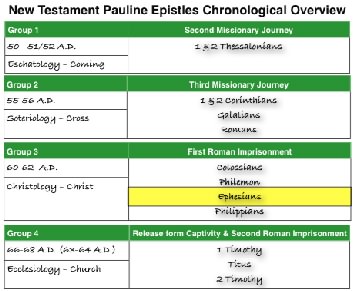 |
|
|
Intro (Ephesians 3:1-10) | Gospel's Value (Ephesians 3:1) | Reliability (Ephesians 3:2-5) | Glory (Ephesians 3:6-7) | Calling (Ephesians 3:8-10) | Questions (Ephesians 3:1-10)
|
A. The Value of the Gospel (Ephesians 3:1)
“For this reason I, Paul, the prisoner of Christ Jesus for the sake of you Gentiles--” (Ephesians 3:1).
The Gospel of Christ is worth dedicating our lives to in whatever context God appoints and calls us.
Paul is utterly convinced that what he lives and suffers for is worth it. We see this in how his first words of Ephesians 3, “for this reason” link us back to the former chapters. Here in chapters 1 and 2 is the powerful declaration of the glories of what God has done in Christ. The gospel is of great value.

Chronology Chart of Paul's Latter Life
In 50-52 AD Paul wrote his first epistles. They were to the Thessalonians and chiefly centered around Jesus’ return. During his third missionary journey in 55-56 AD, he wrote the Corinthians, Galatians and Romans which all clearly defined the meaning and purpose of the cross. It was in 60-62 AD during Paul’s Roman imprisonment that he wrote what we call the prison epistles: Colossians, Philemon, Philippians including Ephesians the book we are now studying. This was where the Book of Acts left us off. He was on house arrest, free to talk but not free to go. Paul during this imprisonment wrote a letter to the church at Ephesus and the surrounding areas.
The word ‘prisoner’ reminds us of the cost of Paul’s ministry. He says in many places that his life and ministry, are like Siamese twins, one cannot easily separate them. Jesus even His call of Paul directly said he would have to suffer much for Christ’s Name. His mission strangely enough, was not for the Jews but for those pagans spread throughout the world. They did not have God’s Word.
What changes took place that made Paul, a strong religious Jew, to suffer for these pagans? Deep down, we find that he was not serving himself, but others. The ability to see the genuineness of his life is important because it is then we can trust those things that he said. He had no ulterior motives. If he wanted fame, riches or power, he only had to stay as he was - a highly educated respected Jewish leader. All those things he gave up so that he might suffer for the sake of those he beforehand had despised. But before going on, Let’s reflect a bit more on what it is that he attributes his great devotion to these pagan people (“for this reason”).
From the beginning of the book of Ephesians Paul has been declaring the glory of the gospel. Chapter 1 into chapter 2 spoke about the truth of the gospel. We see God’s amazing grace reaching down to ordinary lives. God unleashed His love on unlovely mankind. He poured out His care on those who should have received God’s wrath. Although in Ephesians 2:1 Paul used the word ‘you’ to describe them in their sins, it is in 2:3 that he joins himself and perhaps any others that might exclude themselves from the former category as with them in the same predicament.
Among them we too all formerly lived in the lusts of our flesh, indulging the desires of the flesh and of the mind, and were by nature children of wrath, even as the rest (Ephesians 2:3). [See full article on Ephesians 2:1-3].
Man was totally unable to earn or deserve salvation. Man was so embedded into the the world that he was condemned along with it. The Gospel message, however, was a free gift given by God to mankind wrapped in the love of His beloved Son Christ Jesus. This is the truth of the Gospel. His Son’s life for the sake of others. Paul’s words, “for the sake of you Gentiles” (Ephesians 3:1), reflects this same kind of self-sacrificing love.
We also must remember the purpose of the Gospel. Paul starts to speak clearly about this in Ephesians 2:7 and will continue on well into chapter 4 speaking the great and glorious purpose that God has in building up the body of Christ. When we begin to catch Paul’s vision for the church, which is really God’s vision for all of God’s people, then we can better appreciate what moves Paul to so dedicate his life to serve the Gentiles. The vision might become tarnished a bit if you stare at the church on earth, but if one looks often enough at what God is doing, one will also be humbled and stand back in awe that we could ever be a part of God’s amazing work.
Summary:
The Gospel of Christ is worth dedicating our lives to in whatever context God appoints and calls us because what God is accomplishing through it is totally awesome.
Application
Let me make a special application to mothers or mothers to-be. Many of you are loaded down with little ones wanting to eat, needing to be changed or go to the park. Remember, you are part of God’s overall purpose of bringing the Gospel to the ends of the earth. Like the apostle God has entrusted a certain mission to you. You are to raise up godly men and women. This is a higher than the typical CEO.
You get to impart a vision of sacrifice, prayer and dedication into the hearts of your children. If you think little of your job as a mother, you think wrongly of it. Will you be publicly noticed for all your labor. No, probably not. Will your children genuinely understand your sacrifice? Probably not ever. Will anyone know all the things of the world you have given up so that you can pray and care for them? Indeed not. This is your appointment, your calling, your service and suffering. Do not reject the call to raise up many godly children in this godless age. Unless you have the same fervor for the gospel of Christ, you will waver and give up. But if you hold on tight to this vision, you will see God’s mighty Spirit move in your life and the lives of your children. Much of Christendom has departed from God’s Word and envied the shine of the world. Keep faithful to what God has entrusted to you. As Paul elsewhere says,
But women shall be preserved through the bearing of children if they continue in faith and love and sanctity with self-restraint. (1 Timothy 2:15).
Next: The reliability of the Gospel in Ephesians 3:2-5.
Tender Care for the Newborn
Devasting Effects of Secular Parenting
 Most of BFF articles such as this one is nicely formatted for printing. This article also has a Powerpoint. Check out the great number of articles on the BFF Biblical Training Library all at one low cost. |
Read more exciting and practical articles on the Book of Ephesians.
Introduction to the Book of EphesiansPaul's Second Missonary Journey to Ephesus - Map Ephesians 1Ephesians 1:1-3 Every Spiritual BlessingEphesians 1:1-3 Every Spiritual Blessing Ephesians 2Ephesians 2:1-3 Our Need, His GraceEphesians 2:1-3, an Introduction Ephesians 3Ephesians 3:1-10 Growing in Our Commitment |
Ephesians 4Ephesians 4:1-3 Preserving the Spirit's UnityIntro: Problems of Disunity Ephesians 4:11-16 The Purpose of TrainingEphesians 4:11-13: A) God's Word in the Church Ephesians 4:14 B) Responsibility 1. Deceit Ephesians 4:11-14 Chart: Equipping of the Saints Ephesians 5-6Ephesians 5:22,24 Wives be Subject to your Husband |
BFF Homepage | Top | Back | BFF Topics | BFF Bible articles | Ephesians 3:1-10 Study questions | Next =>
Biblical Foundations for Freedom
Paul J. Bucknell
NASB Bible used